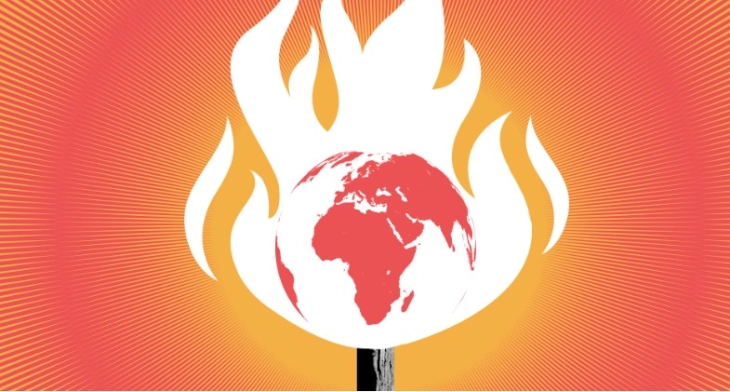UN chief warns of harms from ‘crippling heat’ as temps hit records
- The United Nations secretary-general has issued a stark warning on “crippling heat” as the world experiences its three hottest days on record.
- Post By Ivan Kolekevski
- 21:03, 25 July, 2024

London, 25 July 2024 (dpa/MIA) - The United Nations secretary-general has issued a stark warning on “crippling heat” as the world experiences its three hottest days on record.
Antonio Guterres warned Earth was becoming “hotter and more dangerous for everyone, everywhere,” as he pointed to a deadly heatwave hitting Africa’s Sahel region, 1,300 people dying in scorching conditions in the Hajj in Saudi Arabia, record temperatures in the United States and Europe’s “sweatbox cities.”
And the EU’s Copernicus Climate Change Service declared Sunday July 21 as the hottest day on record, a record promptly beaten on Monday, with preliminary data suggesting Tuesday was in the same range, he said.
Guterres called for action to protect vulnerable people, workers and cities from the growing threat of heatwaves and temperatures topping 50 degrees Celsius.
And he demanded efforts to tackle the root cause of the problem, calling it a disease of the “madness of incinerating our only home,” addiction to fossil fuels and climate inaction.
He criticized rich countries for fossil fuel expansion, warning “in signing such a surge of new oil and gas licences they are signing away our future.”
The warning comes after research by the International Institute for Sustainable Development warned of booming oil and gas exploration, with rich countries including the US and UK issuing two-thirds of the global number of oil and gas licences since 2020.
The ongoing oil and gas exploration is despite assessment by the International Energy Agency (IEA) that no new coal mines or oil and gas fields can be developed after 2021 if temperature rises are to be limited to 1.5 degrees Celsius – the threshold beyond which the worst impacts of climate change are expected.
In his speech, Guterres said: “Crippling heat is everywhere – but it doesn’t affect everyone equally.
“Those most at risk when the mercury soars include the urban poor. Pregnant women. People with disabilities. Older people. The very young, the sick, the displaced, and the impoverished – who often live in substandard housing without access to cooling.”
He said extreme heat amplified inequality, worsened food insecurity and pushed people further into poverty.
He called for action to increase “massively” access to low-carbon cooling, expanding passive cooling such as natural solutions and urban design and cleaning up cooling technologies while boosting efficiency.
There should be a scaling-up of heat health warning systems, and developed countries should honour their promises and deliver finance to help poor nations and communities adapt to climate change.
He said 2.4 billion people in the global workforce were now at high risk of extreme heat, harming health and productivity with heat stress at work predicted to cost the global economy $2.4 trillion by 2030.
“We need measures to protect workers, grounded in human rights,” he said.
“And we must ensure that laws and regulations reflect the reality of extreme heat today – and are enforced.”
He also called for measures to boost the resilience of economies and societies, as infrastructure buckles, crops fail, and pressure is piled on water supplies, power grids and health systems by extreme heat.
Cities are a particular worry, he warned, as they are heating at twice the global average, and he called for countries, cities and sectors to have comprehensive tailored heat action plans based on the best science and data.
Photo: UN







